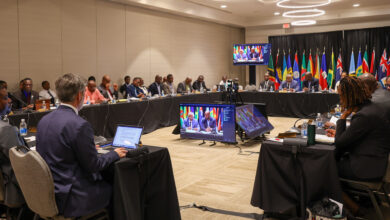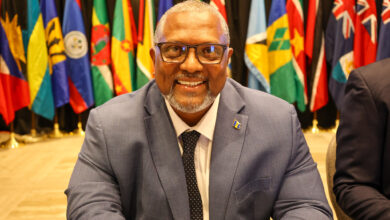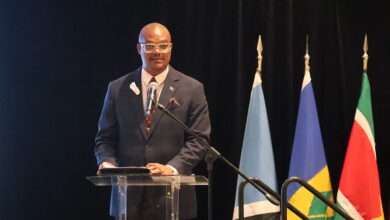Hon. Prime Minister Stephenson King, Lead Head for Sustainable Development
Mr. Edwin Carrington, Secretary General of CARICOM
Ministers
Negotiators:
Permit me first to convey the regret of President Jagdeo, Chairman of CARICOM, for not being in a position to attend.
Colleagues, we are at a critical milestone, on the road to a new ambitious climate change agreement that has the potential to go down in history as the Agreement that enabled the global community to change course from the destructive path is has taken. As you know, a tremendous amount of work is taking place leading up to Copenhagen later this year.
In December 2007, the Bali Acton Plan was agreed, which set out a process that would ensure that progress would be made and a set of recommendations would be presented at COP 15 in Copenhagen. Our negotiators have fought many battles in the ensuing meetings in Accra, Poznan and Bonn, and continue to work tirelessly behind the scenes. I wish to recognise their on-going efforts.
Recently, our Heads agreed on a historic climate change declaration. Our deliberations at this important meeting must give specifics to the broad outline and serve as a useful and uncompromising guide for our negotiators. The primacy of the Liliendaal Declaration on Climate Change and Development cannot be overstated in this process and our positions must be consistent.
Our agenda identifies what I consider critical strategic and policy areas that merit priority.
Firstly, adaptation to climate change is a critical area for all of us. With our region, we are very aware of sea level rise and its implications, especially for those of us who live below sea level. As small islands and low lying coastal developing states, we are highly vulnerable to the effects of rising sea levels. The effects on coral reefs, fisheries, food security and our very survival, must not be lost in the rhetoric. We must intensify our lobby for adaptation and related capacity building for our level of vulnerability must be a key criterion that is to be taken into account. A multi-window insurance facility, as well as adequate and predictable financing for adaptation must be made available to us as soon as possible.
Secondly, we must step up our call for enhanced investment and action in Research and Development, diffusion and transfer of technology for adaptation, including the removal of barriers that exist in overly stringent intellectual property rights. Highly vulnerable and still developing countries, such as ours should be exempted from patent protection of climate-related technologies for adaptation and mitigation.
Thirdly, on the mitigation side, we need to hold steadfast to our call for deep emission cuts based on scientific findings. The most recent findings show that climate change is accelerating faster than originally predicted, making the need for deeper cuts even more critical than previously thought. We cannot allow for 450 ppm or 2 degrees C temperature rise to be agreed. We must push for 350 ppm or 1.5 degrees C if we want to rest assured that we are guarding our vulnerable coastal areas, against devastation from rising sea levels.
Fourth, equally important, colleagues, is a forest-based solution to mitigation. Deforestation and forest degradation account for almost one-fifth of all greenhouse gas emissions, and must hence be a significant component of the global solution. The Low Carbon Development Strategy that was recently launched in Guyana, and recognised by Heads of Government, sets out a vision and a mechanism through which Guyana would be able to avoid deforestation, despite the significant economic pressures that we face.
However, for REDD and REDD plus to be effective mitigation tools, significant financial resources must be available to support them and we must ensure that this is recognised and acted on.
Finally, we must carry a strong and unyielding position on a shared vision. The basic principles underlying such a vision must include:
- Common but differentiated responsibilities
- Historical responsibility
- Polluter pays principle
- Precautionary principle
We must also advocate for an ambitious goal of Annex 1 CO2 reductions of at least 45% by 2020, and 95% by 2050, with developing countries deviating from business as usual.
Colleagues, the UNFCCC negotiations remain in a deadlock due to a lack of consensus on critical issues. Unfortunately, even at the level of the geographical groupings such as G77 and AOSIS, disagreements persist. Within CARICOM, we must not let difference of opinions weaken our cause.
We share a common vulnerability and therefore we need to act in a united front. We must maintain our position for deeper emission cuts as this is crucial if we are to avert catastrophic global climate change. Deep emission cuts will also open opportunities for REDD and REDD+ mitigation efforts.
Colleagues, I urge all of us to work together and ensure that by the end of the day, we come out with a united position on all issues, and give a strong cohesive mandate to our negotiators in the critical weeks ahead as envisaged in the Liliendaal Declaration on Climate Change and Development.
I thank you.





